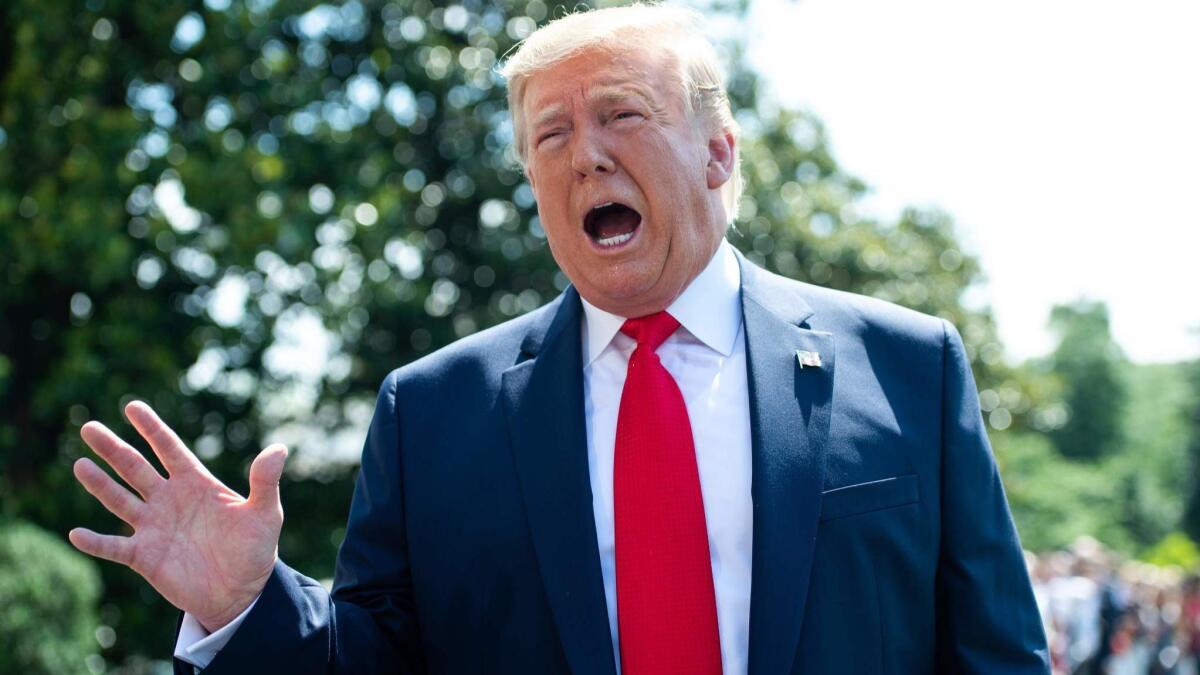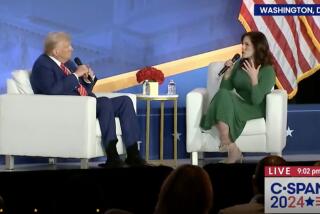Op-Ed: No, there isn’t a double standard for conservatives and liberals on social media

- Share via
If you listen to conservatives, including President Trump, social media companies are censoring them, and the courts are making things worse.
In a burst of early morning tweets on Thursday, Trump decried “bias, discrimination and suppression” by social media companies, reprising a familiar theme for the president and others who say the platforms censor conservative viewpoints.
Earlier in the week, a federal appellate court added insult to injury for the president by ruling that his once-private Twitter account was now a town square, where the 1st Amendment forbids him from censoring his critics.
It’s easy to see why conservatives might cry foul about an apparent double standard that allows social media companies to ban content but prevents the president from blocking those who disagree with him. But is this really a case of unequal treatment?
Trump pretty much lost the case when he conceded that he blocked the plaintiffs because ‘of their criticism’ of him, a classic 1st Amendment no-no.
No. The courts have repeatedly ruled that social media platforms like Facebook and Google are free to make their own rules on what speech to allow and what speech to block because they are private companies, not government actors subject to the 1st Amendment’s anti-censorship rules.
The decision by the U.S. 2nd Circuit of Appeals in Knight First Amendment Institute vs. Trump did nothing to change that. The court ruled that the president — not Twitter — is governed by the 1st Amendment’s anti-censorship rules because he has transformed his formerly private Twitter account into an official White House mouthpiece and government public forum, and therefore it must be open to all. It is Trump’s government job and his official actions on Twitter that put him under the 1st Amendment’s anti-censorship rules and make it illegal for him to block his Twitter critics.
The 1st Amendment “does not permit a public official who utilizes a social media account for all manner of official purposes to exclude persons from an otherwise-open online dialogue because they expressed views with which the official disagrees,” the panel ruled in a 3-0 decision.
The ruling was a victory for seven plaintiffs, including a doctor, a professor and a police officer, who sued Trump after he blocked their critical tweets on his @realDonaldTrump account.
Trump and his Department of Justice lawyers argued that the 1st Amendment should not apply to Trump’s @realDonaldTrump account because he opened it as a private citizen in 2009 and he continued to operate it as a private citizen, not a state actor.
That may have been true in 2009 and will be true again when Trump leaves office, the court said. But after his 2016 election, President Trump transformed his once-private Twitter account into “government-controlled property” by tweeting about “matters related to official government business,” including his surprise tweets that he had replaced Chief of Staff Reince Priebus with Gen. John Kelly and banned transgender soldiers serving in the military.
Trump pretty much lost the case when he conceded that he blocked the plaintiffs because “of their criticism” of him, a classic 1st Amendment no-no.
“Viewpoint discrimination” by the government in a public forum violates the 1st Amendment, the court said. “By blocking the Individual Plaintiffs and preventing them from viewing, retweeting, replying to, and liking his tweets, the President excluded the Individual Plaintiffs from a public forum, something the First Amendment prohibits.”
So why, then, can social media companies block some users? The courts have repeatedly ruled that their platforms are run by private businesses, not government actors, and operate outside the reach of the 1st Amendment’s censorship rules. In this way, social media companies are like the Los Angeles Times or Fox News — they have the right to control their content, as the Supreme Court ruled in Miami Herald vs. Tornillo in 1974 — and can make rules governing what they consider to be appropriate online conduct and regulating things such as hate speech.
Enter the Fray: First takes on the news of the minute »
Just last month, the Supreme Court shot a big hole in the argument that social media platforms were required by the 1st Amendment to provide neutral public forums for all users. The court’s decision in Manhattan Community Access Corp. vs. Halleck involved a public-access cable television station, not a social media platform, but the court’s broad language is sure to be cited by social media companies. “A private entity” that “opens its property for speech by others,” Justice Brett M. Kavanaugh wrote for the divided 5-4 court, “is not transformed by that fact alone into a state actor,” and therefore is free to censor users.
Of course, if Trump can’t block his critics on his Twitter account, neither can Rep. Alexandria Ocasio-Cortez (D-N.Y.). Immediately after the Trump Twitter decision was published, two of her critics sued her for blocking them on her Twitter account.
However, if Ocasio-Cortez — or Trump — asks Twitter to suspend critics because they violate the platform’s hate speech rules, Twitter is free to suspend those users. The Trump Twitter decision does not take away Twitter’s right to censor hate speech.
Susan E. Seager is a media lawyer and lecturer at UC Irvine Law School, where she heads the press freedom and transparency practice at the Intellectual Property, Arts and Technology Clinic.
More to Read
A cure for the common opinion
Get thought-provoking perspectives with our weekly newsletter.
You may occasionally receive promotional content from the Los Angeles Times.










